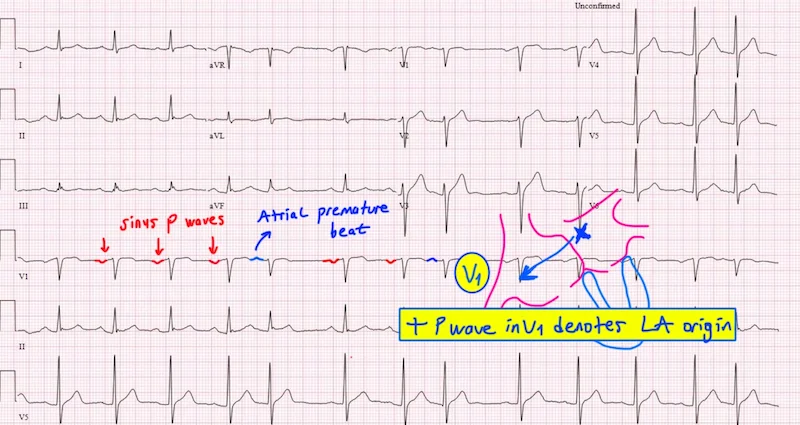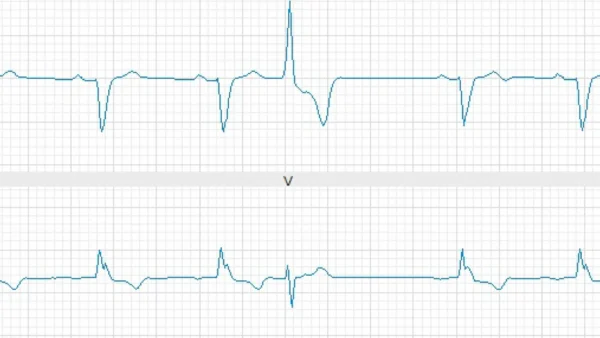Premature beats are early heartbeats that occur sooner than expected in the normal rhythm cycle. Many people describe them as a skipped beat, a flutter, or a sudden strong thump in the chest. Although they can feel alarming, premature beats are extremely common and, in most cases, harmless.
These extra beats interrupt the heart’s regular rhythm momentarily and are often followed by a brief pause. It is this pause—and the stronger beat that follows—that usually makes people notice them.
What Are Premature Beats?
In a normal heartbeat, electrical signals follow a steady and predictable timing. Premature beats occur when an electrical signal fires earlier than it should, before the heart has fully completed its usual cycle.
There are two main types of premature beats, depending on where the early signal originates:
- Premature Atrial Contractions (PACs), which start in the atria
- Premature Ventricular Contractions (PVCs), which start in the ventricles
Both types can occur in healthy hearts as well as in people with heart disease.
How Premature Beats Feel
Premature beats do not always feel the same. Some people barely notice them, while others are very sensitive to even a single extra beat.
Common sensations include:
- A feeling that the heart “skipped” a beat
- A sudden thump or jolt in the chest
- Brief fluttering
- Awareness of an irregular heartbeat
Importantly, the discomfort usually comes not from the premature beat itself, but from the stronger heartbeat that follows it.
Why Premature Beats Occur
Premature beats often occur without a clear cause and may come and go unpredictably. In many cases, they are triggered by factors that temporarily increase the heart’s excitability.
Common triggers include:
- Stress or anxiety
- Caffeine or energy drinks
- Alcohol
- Poor sleep or fatigue
- Dehydration
- Fever or illness
Hormonal changes and certain medications can also increase their frequency. In people with underlying heart disease, premature beats may occur more often, but their presence alone does not automatically indicate a serious problem.
Are Premature Beats Dangerous?
This is the most important question for most patients—and in the vast majority of cases, the answer is reassuring.
Occasional premature beats in an otherwise healthy heart are generally benign and do not require treatment. They do not increase the risk of heart attack or sudden cardiac death.
However, premature beats may warrant closer evaluation if they:
- Occur very frequently
- Are associated with dizziness, fainting, or chest pain
- Appear in someone with known heart disease
Rarely, a very high burden of premature beats over long periods can weaken the heart muscle. This is uncommon but important to recognize.
How Premature Beats Are Diagnosed
Premature beats are often captured on an electrocardiogram or during heart rhythm monitoring. Because they may not occur during a short test, longer monitoring is frequently used to assess how often they happen and what type they are.
Imaging tests may be performed to ensure that the heart’s structure and pumping function are normal, especially when premature beats are frequent or symptomatic.
The goal of evaluation is not simply to label the rhythm, but to determine whether it is benign or requires attention.
Treatment Options for Premature Beats
Many people with premature beats do not need any specific treatment. Reassurance alone is often enough once serious causes are ruled out.
When symptoms are bothersome, treatment focuses first on reducing triggers. Limiting caffeine and alcohol, improving sleep, managing stress, and staying well hydrated can significantly reduce symptoms.
If lifestyle measures are not sufficient, medications that calm the heart’s electrical activity may be used to reduce the frequency of premature beats. These treatments aim to improve quality of life rather than eliminate every extra beat.
In rare cases where premature beats are extremely frequent and affect heart function, catheter ablation may be considered. This procedure targets the specific area producing the early beats and can be highly effective in carefully selected patients.
Living With Premature Beats
Living with premature beats can be frustrating, especially when they occur unpredictably. Understanding that these beats are common and usually harmless helps reduce anxiety, which itself can worsen symptoms.
Regular follow-up and open communication with healthcare providers ensure that changes in symptoms are evaluated appropriately without unnecessary worry.
In Summary
Premature beats are early heartbeats that disrupt the normal rhythm momentarily. They are common, often benign, and frequently triggered by everyday factors such as stress or stimulants. While they can feel uncomfortable, most premature beats do not signal serious heart disease. Proper evaluation, reassurance, and simple lifestyle adjustments are often all that is needed.
Reference: Premature Ventricular Complex

